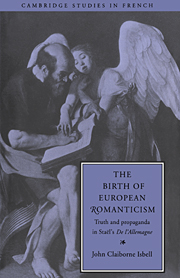Book contents
- Frontmatter
- Contents
- Acknowledgements
- List of abbreviations
- Author's note
- Introduction
- 1 Birth of a nation – Staël's Romantic Germany in 1810
- 2 Romantic literature and politics
- 3 Philosophy and ethics in Napoleonic Europe
- 4 Religion, love, enthusiasm – a new Enlightenment
- Conclusion
- Appendix: De l'Allemagne titles and dates
- Notes
- Bibliography
- Index
- Cambridge Studies in French
1 - Birth of a nation – Staël's Romantic Germany in 1810
Published online by Cambridge University Press: 23 September 2009
- Frontmatter
- Contents
- Acknowledgements
- List of abbreviations
- Author's note
- Introduction
- 1 Birth of a nation – Staël's Romantic Germany in 1810
- 2 Romantic literature and politics
- 3 Philosophy and ethics in Napoleonic Europe
- 4 Religion, love, enthusiasm – a new Enlightenment
- Conclusion
- Appendix: De l'Allemagne titles and dates
- Notes
- Bibliography
- Index
- Cambridge Studies in French
Summary
L'Allemagne ne peut attacher que ceux qui s'occupent des faits passés et des idées abstraites. Le présent et le réel appartiennent à la France; et, jusqu'à nouvel ordre, elle ne paraît pas disposée à s'y renoncer.
(1 199/15)De l'Allemagne's author made five trips to German lands: brief trips in 1789–93, two high-profile visits in 1803–7, and a month in 1812 on her way to London. Exiled by Napoleon in 1803, Staël chose German soil over Coppet, her home outside Geneva: ‘je voulais opposer l'accueil bienveillant des anciennes dynasties à l'impertinence de celle qui se préparait à subjuguer la France’ (DxA 63). She spent three weeks in Frankfurt, her only stay in western Germany, ten in Weimar where Schiller and Goethe staged their plays for her benefit, and six in Berlin. When her father died in April 1804, she rushed home to Coppet with A. W. Schlegel, prince of German Romantics, as her children's new tutor; he stayed with her until 1817. In 1807, Staël again left her exile in Coppet for a tour of southern Germany: Munich (three weeks) and Vienna. She left Vienna five months later in May 1808 for a week in Prague and Bohemia, returning via Dresden, Weimar and Frankfurt. On 8 July, back in Coppet, she took out her old notes and began her book.
Many French citizens were in German lands throughout this period. Roughly 50,000 emigrés had been in Hamburg since the Revolution, and the amnesties of 1799 still left 145,000 emigrés abroad.
- Type
- Chapter
- Information
- The Birth of European RomanticismTruth and Propaganda in Staël's 'De l'Allemagne', 1810–1813, pp. 10 - 54Publisher: Cambridge University PressPrint publication year: 1994



